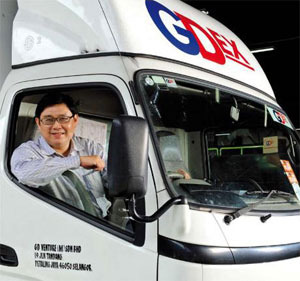As the economic recovery picks up pace, it is becoming common once again to see financial results leaping sharply upwards in this or that sector. But for some companies, a steady stream of small improvements has proved itself to be the best way of getting ahead, whether in good times or in bad.
This philosophy of progressing in baby steps is the favoured approach of GD Express, one of the fastest growing express delivery companies in Malaysia. Established in 1997 and listed on Bursa Malaysia since 2005, GDEX has two core businesses: the delivery of conventional consignments for direct customers, and logistics solutions for corporate customers. Its network includes over 100 stations throughout Malaysia, as well as a branch in Singapore which provides cross-border deliveries.
Over the last 10 years, GDEX has advanced its operations through the accomplishment of several hundred small but significant improvements each year, focusing on the delivery of reliable and high quality service above all. It is a strategy that pays off over the long term, and indeed GDEX has seen its business increase by more than 10 times. It currently handles more than 8 million packages annually.
Some of GDEX’s developments are easy to pick out: for instance, it recently completed the acquisition of the land and property used for its operating headquarters and logistics hub, an estimated total of 200,000 square feet. Others were less visible, such as when it pioneered the adoption of the conveyor processing system to sort shipments, or when it became the first local express delivery company to obtain ISO certification for all its headquarter departments in 2003.
A particularly significant advancement which took place more recently is the launch of the GDEX Foundation. The foundation provides financial assistance to the company’s staff, not just as a mark of corporate social responsibility, but also a sign of the importance GDEX places on its people. Like any other service-oriented industry, express delivery is fundamentally labour intensive and this cannot be changed. Its greatest challenge lies in creating and maintaining a well-trained, committed workforce, and GDEX has addressed this challenge by investing in the continuous training and development of its people, recognising that they are its greatest asset. During the 2009 slowdown, for instance, it spent the downtime on extra training for its more than 1,400 staff, chalking up over 24,000 man-hours to ensure that once the economy picked up its people would be in position to take advantage of the recovery. Now, one of the things on its to-do list is to improve the compensation packages of its staff, making itself more competitive in recruitment.
Improved recruitment is certainly one area which will prove to be an advantage. The express delivery industry has seen a sharp upward trend in demand over the last few years, due in large part to the growth of B2B service and cross-border online retail. While this is a good sign for companies such as GDEX, it also means that the delivery segment is becoming increasingly competitive. Not only are regional and international companies stepping up their activities, there are new entrants in the form of other logistics specialists looking to broaden their business.
Besides people development, GDEX plans to continue raising its competitiveness through further building up its infrastructure, facilities, systems and processes, and is currently also looking into the feasibility of overseas expansion. In line with its baby-step philosophy, the company has a long-term plan for its steady growth over the next decade, and this plan includes gradually extending its business into neighbouring countries.
Rather than concentrating on quarter to quarter financial performance alone, GDEX’s focus is on executing its plans systematically and with care. Its priority has always been to provide a consistent high quality of service to its customers, and it carefully monitors its service processes to ensure that the quality is not only maintained but steadily increased. In this way, it has been able to retain its customers by adding value to their businesses.
At the same time, GDEX exercises great financial discipline to maintain a steady cash flow and healthy balance sheet. To ensure that the company’s long-term goals can always be kept in view, the board of directors assesses the management team based on return on assets (ROA) rather than return on equity (ROE). This careful and conservative approach leaves GDEX with much leeway to handle disruptions to its business, a constant factor in the express delivery industry, and thus gives it great resilience during trying periods such as the recent recession. It also keeps the company in a good position to benefit from opportunities. And over the last two quarters, in fact, GDEX has seen its performance improve in tandem with the economic rebound.
With its focus on quality service and growth based on solid assets, GDEX may not stand out among companies that display more attractive quarterly reports. But its strong, consistency-focused corporate culture and its ability to plan for the long run, then execute those plans with great precision, make up a bigger picture than short-term results would-and the picture is a good one.




Leave A Comment